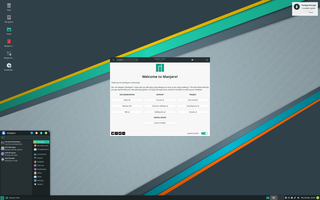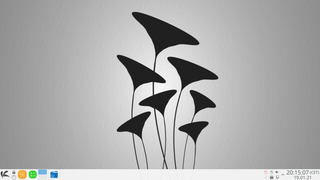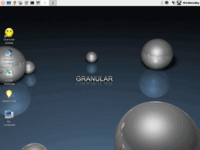
Xandros, Inc. was a software company which sold Xandros Desktop, a Linux distribution. The name Xandros was derived from the X Window System and the Greek island of Andros. Xandros was founded in May 2001 by Linux Global Partners. The company was headquartered in New York City.

A light-weight Linux distribution is one that uses lower memory and/or has less processor-speed requirements than a more "feature-rich" Linux distribution. The lower demands on hardware ideally result in a more responsive machine, and/or allow devices with fewer system resources to be used productively. The lower memory and/or processor-speed requirements are achieved by avoiding software bloat, i.e. by leaving out features that are perceived to have little or no practical use or advantage, or for which there is no or low demand.

PCLinuxOS, often shortened to PCLOS, is an x86-64 Linux distribution, with KDE Plasma Desktop, MATE and XFCE as its default user interfaces. It is primarily free software operating system for personal computers aimed at ease of use. It is considered a rolling release.

ALT Linux is a set of Russian operating systems based on RPM Package Manager (RPM) and built on a Linux kernel and Sisyphus package repository. ALT Linux has been developed collectively by ALT Linux Team developers community and ALT Linux Ltd.

VectorLinux, abbreviated VL, is a Linux distribution for the x86 platform based on the Slackware Linux distribution, originally developed by Canadian developers Robert S. Lange and Darell Stavem. Since version 7 the Standard Edition is also available for the x86-64 platform, known as VLocity64 7.

TrueOS is a discontinued Unix-like, server-oriented operating system built upon the most recent releases of FreeBSD-CURRENT.

BeleniX is a discontinued operating system distribution built using the OpenSolaris source base. It can be used as a Live CD as well as installed to a hard disk. Initially developed as a Live CD along the lines of Knoppix to showcase OpenSolaris technologies. Belenix went on to become the initial base for Sun's OpenSolaris distribution. A number of technologies pioneered in the Belenix project have gone on to become full projects in their own right within the OpenSolaris ecosystem.
A desktop environment is a collection of software designed to give functionality and a certain look and feel to an operating system.

LXDE is a free desktop environment with comparatively low resource requirements. This makes it especially suitable for use on older or resource-constrained personal computers such as netbooks or system on a chip computers.

Software remastering is software development that recreates system software and applications while incorporating customizations, with the intent that it is copied and run elsewhere for "off-label" usage. The term comes from remastering in media production, where it is similarly distinguished from mere copying.

Foresight Linux was a Linux distribution comprising free and proprietary software with the goal of showcasing the latest in Linux desktop technologies. Foresight is developed by the Foresight community and is based on rPath, it also follows a rolling release cycle, instead of a time-based release schedule.

Calculate Linux is a Linux distribution optimized for fast deployment in an organization environment. It is based on the Gentoo Linux project and includes many preconfigured functions.

Salix OS is a multi-purpose Linux distribution based on Slackware.

Porteus is a portable operating system based on Slackware. It does not require installation and can be run from fixed and removable media, such as a USB flash drive or compact disc.

Mageia is a Linux-based operating system, distributed as free and open source software. It was forked from the Mandriva Linux distribution. The Greek term mageía (μαγεία) means enchantment, fascination, glamour, wizardry.

Manjaro is a free and open-source Linux distribution based on the Arch Linux operating system that has a focus on user-friendliness and accessibility. It uses a rolling release update model and Pacman as its package manager. It is developed mainly in Austria, France and Germany.

Antergos is a discontinued Linux distribution based on Arch Linux. It includes the GNOME desktop environment by default but it could also employ the Cinnamon, MATE, KDE Plasma 5, Deepin, and Xfce desktops. It was first released in July 2012 as Cinnarch and by June 2013 it was ranked among the top 40 most popular distributions viewed at DistroWatch. The Galician word Antergos was chosen "to link the past with the present".

MX Linux is a Linux distribution based on Debian stable and using core antiX components, with additional software created or packaged by the MX community. The development of MX Linux is a collaborative effort between the antiX and former MEPIS communities. The MX 'name' comes from the M for MEPIS and the X from antiX - an acknowledgment of their roots. The community's stated goal is to produce "a family of operating systems that are designed to combine elegant and efficient desktops with high stability and solid performance".

KaOS is a desktop Linux distribution that features the latest version of the KDE desktop environment, the LibreOffice office suite, and other popular software applications that use the Qt toolkit.




















